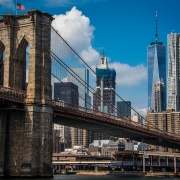Coronavirus is making some people rethink where they want to live
Appearing in: CBS58
By: Catherine E. Shoichet and Athena Jones, CNN
A moving truck came to Rebecca Stevens-Walter’s New York apartment this week.
But she wasn’t there to help pack boxes or supervise the crew.
In mid-March, the 39-year-old pastor flew to New Mexico with her husband and two kids. They left so suddenly they barely had time to prepare for the trip.
“We fled,” she says. “Our apartment looked like the rapture had come. … And we definitely had the conversation, ‘What if we don’t go back?'”
The streets of the city she loves — and many major cities across the US — are hauntingly empty as the pandemic leaves most of the country on lockdown.
It’s a chilling sign of the times, and one that brings to mind a big question: After the pandemic passes, will some people choose to leave big-city life behind?
That trend was already starting to emerge in some parts of the country, even before coronavirus hit.
Now the pandemic is changing the way we talk about life in big cities. And some experts say it could change who opts to live in them.
Stevens-Walter says her family does plan to return to New York. But others who recently left the city told CNN they aren’t so sure.
“It’s hard to think about living in New York when we don’t have our existence and our careers there,” says Ashley Arcement, a dancer, singer and actor who headed to a friend’s house in Florida with her boyfriend, a pianist, after Broadway shut down in March.
“Before this,” Arcement says, “we weren’t the kind of people who wanted to live outside the city and commute in. … Now it’s like, will it ever be the same?”
New York’s governor says density is to blame
With Broadway shut down, restaurants open only for takeout and many people working from home — if they still have a job — these days the city that never sleeps is looking downright dormant.
But that wasn’t the case a few months ago, when coronavirus started to spread through America’s largest and densest city.
New York quickly became the epicenter of the country’s coronavirus outbreak, spurring stay-at-home orders from officials to keep contagion at bay.
While the number of new coronavirus cases reported daily in New York has started decreasing, the death toll continues to climb. More than 12,000 coronavirus deaths have been confirmed in the city so far.
New York Gov. Andrew Cuomo hasn’t minced words when he describes the reasons he sees for the rapid spread of the virus.
“Why New York? Why are we seeing this level of infection? Well, why cities across the country?” Cuomo said at a news briefing last month.
“It’s very simple,” the governor said. “It’s about density. It’s about the number of people in a small geographic location allowing that virus to spread. … Dense environments are its feeding grounds.”
He sees sprawl as a saving grace
On the other side of the country, Joel Kotkin says the situation that’s unfolding is notably different.
In a recent opinion piece published in the Los Angeles Times, Kotkin credited that city’s sprawling development with slowing the spread of coronavirus. The headline: “Angelenos like their single-family sprawl. The coronavirus proves them right.”
The executive director of the Houston-based Urban Reform Institute, Kotkin argues that cities were already in trouble. And in the age of social distancing, he says, dense cities particularly have a lot going against them.
“How do you open up an office with expensive real estate if people have to be six feet apart? How are you going to have a city dependent on subways if you’re going to have any social distancing at all?” he tells CNN. “People will continue to move more into the periphery and into smaller cities, where basically you can get around without getting on (public) transit.”

 Photo credit: Ted McGrath
Photo credit: Ted McGrath
